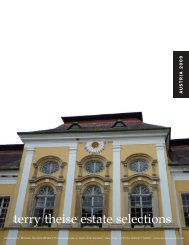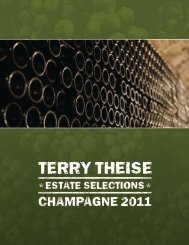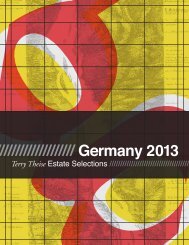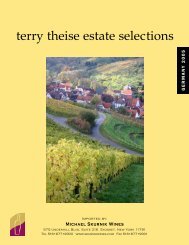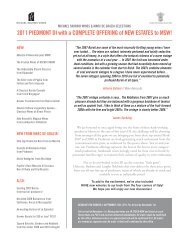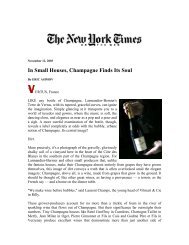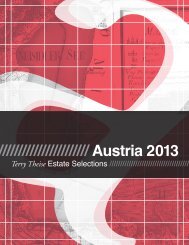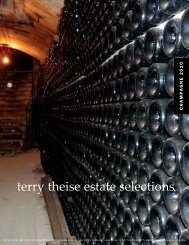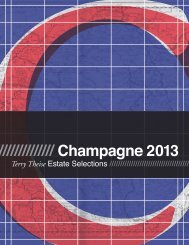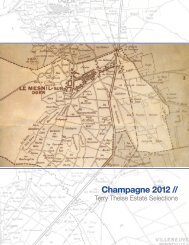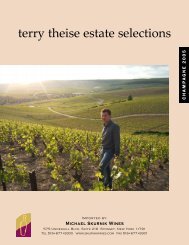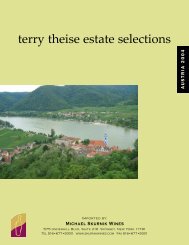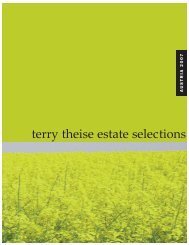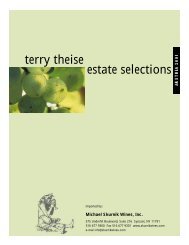German Catalog 2006 USE THIS ONE.qxp - Michael Skurnik Wines
German Catalog 2006 USE THIS ONE.qxp - Michael Skurnik Wines
German Catalog 2006 USE THIS ONE.qxp - Michael Skurnik Wines
You also want an ePaper? Increase the reach of your titles
YUMPU automatically turns print PDFs into web optimized ePapers that Google loves.
spreitzer<br />
rheingau • oestrich<br />
When one considers the past four vintages, culminating in the sensational collection from 2005,<br />
one is drawn to a single, inescapable conclusion.<br />
Spreitzer has ascended to the top rank in the Rheingau. No one is better, and few are as fine.<br />
Yet the <strong>German</strong> press is likely to feel otherwise, in large part because of the emphasis they lay<br />
on the dry wines. This is reasonable enough. For my part I simply don’t consider a <strong>German</strong> grower’s<br />
dry wine. If they are good I am delighted, and offer them. But this is an extra, not the thing<br />
I come looking for. They could cease producing them altogether and I wouldn’t mind. Nor<br />
would the wine-world be discernibly the poorer.<br />
You might recall a Spreitzer wine finished among the top ten dry Rieslings in all of <strong>German</strong>y<br />
two years ago. I loved it too, and selected it, and was<br />
delighted to show it to you. Our reviewers’ enthusiasms<br />
extended to the “high 80s”—maybe a little too low. Yet<br />
the reverse is also true, as Stuart Pigott wrote in a recent<br />
article for WEIN EXTRA. Noting the difference between<br />
the monster scores (high 90s) certain Dönnhoff wines<br />
received over here, in contrast to the around-90 the same<br />
wines received in <strong>German</strong>y, he said: “Whereas across the<br />
sea tasters everywhere stood and cheered these great<br />
examples of <strong>German</strong> Riesling, inside <strong>German</strong>y they were<br />
met with Hm, well . . . yes, I suppose . . .”<br />
So it’s the silly culture-wars between them and us<br />
which prevents them from recognizing how freakin’<br />
marvelous these Spreitzers have become. Help me<br />
`splain it to them! Oh they get praise enough; (another<br />
“cluster” in Gault-Millau, another “F” in Feinschmecker,<br />
another “star” in Mondo, and another placement on<br />
DM’s 100-best list) but with each of the last three vintages<br />
has exceeded what are increasingly high expectations,<br />
but alas in a style the <strong>German</strong>s do not seem to<br />
cherish.<br />
Andreas & Bernd Spreitzer<br />
•Vineyard area: 11.5 hectares<br />
•Annual production: 6,700 cases<br />
•Top sites: Oestricher Lenchen and<br />
Doosberg, Winkeler Jesuitengarten,<br />
Hattenheimer Wisselbrunnen<br />
•Soil types: Deep tertiary loam and loess<br />
•Grape varieties: 92% Riesling, 8% Spätburgunder<br />
The wines certainly speak in the prevailing “syntax”<br />
of the times: crystalline, refined, perfumey and polished.<br />
These are Rheingau wines as Armin Diel might make<br />
them, as Peter Geiben might make them. Indeed it could<br />
be their diametrically opposed personalities to Leitz’s<br />
wines which allows the two to coexist so benignly, without<br />
“competition” (the close friendship between the two<br />
helps I’m sure!). Where Johannes’ wines are ruggedly<br />
individual, Andreas and Bernd’s wines are, in the best<br />
sense, fashionable, spiffy, well turned-out. Thankfully<br />
the two of them are plenty unpretentious.<br />
The wines do require a certain understanding,<br />
because they are never fined and they often show<br />
reduced aromas. As always these vanish with swirling, if<br />
you remember to swirl, and have the time to wait.<br />
All harvesting is by hand. The must is cleaned by<br />
gravity for 24 hours before whole-cluster pressing. After<br />
fermentation (in wood or jacketed stainless steel, partly<br />
with ambient yeasts partly with cultured yeasts, depending<br />
on the vintage) the wines rest on their gross lees for<br />
some time before receiving their only filtration, with<br />
racking. They are bottled off the fine lees.<br />
In 1997 Andreas and Bernd Spreitzer leased the estate<br />
from their father, who remains active. Johannes Leitz first<br />
tipped me off. He’s friendly with Andreas and wanted to<br />
help. I really don’t think it crossed his mind he was creating<br />
a competitor. Leitz is a guy whose friends will also be<br />
sweethearts, and I was intrigued to taste Spreitzer’s wines.<br />
147<br />
RHEINGAU WINES



